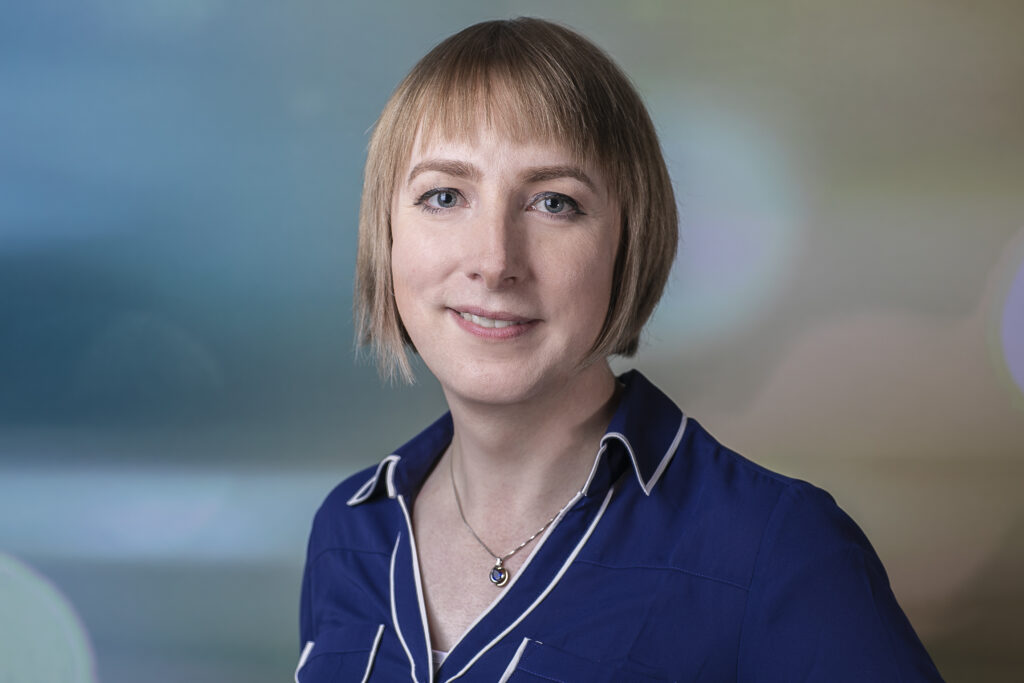Out & Equal exists to help LGBTQ people thrive at work, and to support organizations in creating better workplace culture where everyone feels like they belong. Both of those goals are supported by our partnership with the Korn Ferry Foundation in support of the Leadership U for Humanity program.
“Someone has to be the trailblazer.”
Taylor Rae Swensen (she/her) is a program integrator at Northrop Grumman and graduated from Korn Ferry’s Leadership U. for Humanity program in March 2022. In 2020, she helped launch Northrop Grumman’s first Pride in Diversity Alliance (PrIDA) ERG chapter in Clearfield, Utah—now the fourth largest chapter in the company. Outside of work, Taylor Rae serves on the Patient and Family Advisory Board for the University of Utah’s Transgender Health Program, working to ensure inclusive training and care is given at all University of Utah hospitals.
What drew you to Leadership U. for Humanity? Why did you decide to enroll?
When I saw the Leadership U. for Humanity announcement, I had already been questioning to myself how we could “prime” the leadership pipeline with LGBTQIA+ candidates, so it drew my attention. I decided to enroll in Leadership U. for Humanity because someone has to be the trailblazer. I had already set myself the goal of becoming the first transgender Director at my company, and the development opportunities within LUFH were just what I needed.
What was your experience like going through the program?
This program makes you work! As I endeavored to attend every available session, make and keep commitments to my coach and accountability partners, and consciously apply everything that I learned, it stretched me. I can honestly say that I have grown a lot as a result of this program, and I feel ready to tackle everything that comes after.
What are some key lessons you’ve taken away from your time with LUFH?
Some key lessons I have taken away from my time at LUFH are: Listening is an art. Like any art, it takes practice and patience, but it is so important. If you can’t listen or be seen as someone who listens well, everything else will be harder. Development doesn’t ever really end. I will only continue to grow and develop if I commit to continued training and education throughout my career. Application of learned principles is surest way to put skills in your toolbox. Reading a book or listening to a seminar may be insightful, but application is where results happen.
What have you discovered about yourself as a professional throughout the program?
As a professional throughout the program, I discovered a lot of my weaknesses. I need to listen better. I need to pay closer attention to social queues in large groups. More importantly, I also learned more about my strengths. I already build and maintain productive and beneficial workplace relationships as part of my normal pattern of behavior. As a consequence of being more aware of both my weaknesses and strengths, I can better understand myself and where I can improve or leverage my abilities.
Why is it important for you to be out in the workplace?
I need to be visible so that others can see themselves belonging where I work. If I can be visibly transgender and not shy away from the spotlight, then others can too.
Why is it important for you to be active in LGBTQIA+ inclusion efforts?
It is important for me to be involved in LGBTQIA+ inclusion efforts so that I can give back as I push forward against the boundaries that our community continues to struggle against. Ever forward, never backwards.
What have you taken away from your organization’s partnership with Out & Equal?
Out & Equal has been an invaluable forum for me to interact with my company’s leadership, and to push initiatives to the surface that they may not be hearing about. One of these successfully improved our healthcare coverage for transgender employees and family members.
What are your long-term career goals?
My long-term career goals involve getting to as high a position as possible within whatever company I am in. The purpose of this is twofold: 1: I believe that it is important for LGBTQIA+ professionals to be in leadership, both to improve business results, as well as to inspire others to dream and achieve, 2: I want whatever team I am a part of to win! If diversity in leadership means superior business results, then I need to be one of the decision makers to ensure that happens.
In what ways has being out at work progressed you towards these goals?
Being out at work has given me increased attention and scrutiny. This has ultimately made me more resilient and willing to engage with leadership. In those interactions, I have been able to show my business acumen, as well as my commitment to helping us grow long-term. Also, this has helped me to see where I have room to grow.
What advice do you have for LGBTIA+ professionals who want to enroll in Leadership U for Humanity?
My advice to anyone considering enrollment in Leadership U for Humanity is this: Do it! You will never know if you can be a great leader if you don’t try. Our community needs more people like us in leadership positions. We need to make sure every LGBTQIA+ individual has permission to dream and grow into those roles.
What advice do you have for LGBTQIA+ professionals in general?
Never underestimate the inspiration and example that you are in the workplace. Whether it’s the coworker who never thought they could transition in the workplace until you did, or the child of a coworker who just came out to them, you have an impact far beyond what you will ever know. You are incredibly valuable to whatever organization you are a part of. Take each challenge on with enthusiasm, perspective, and a continual growth mindset.
